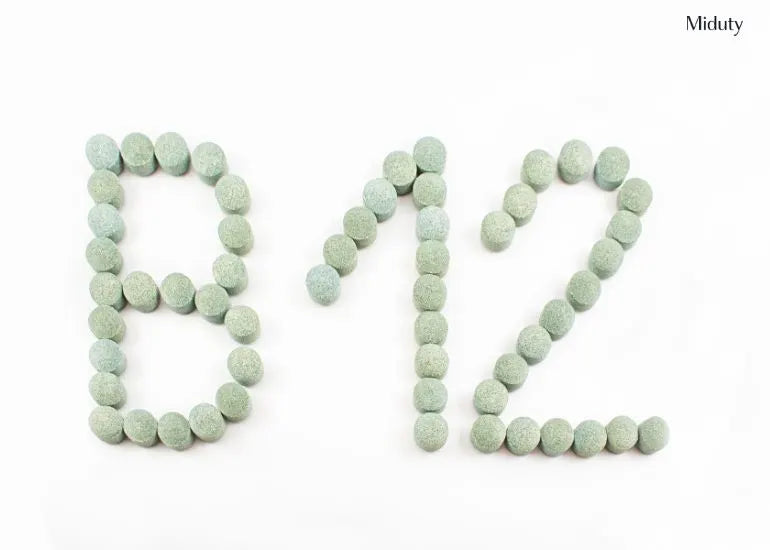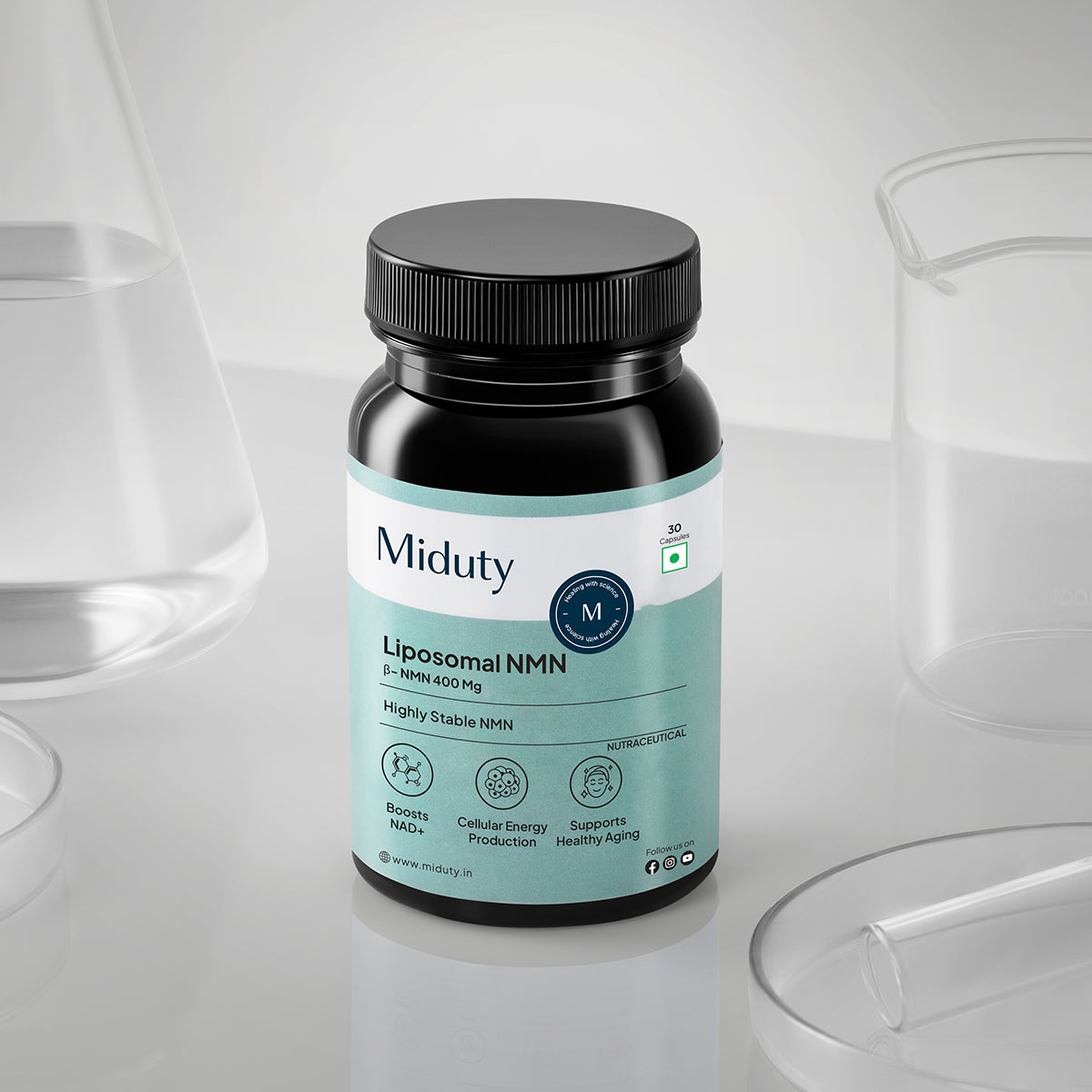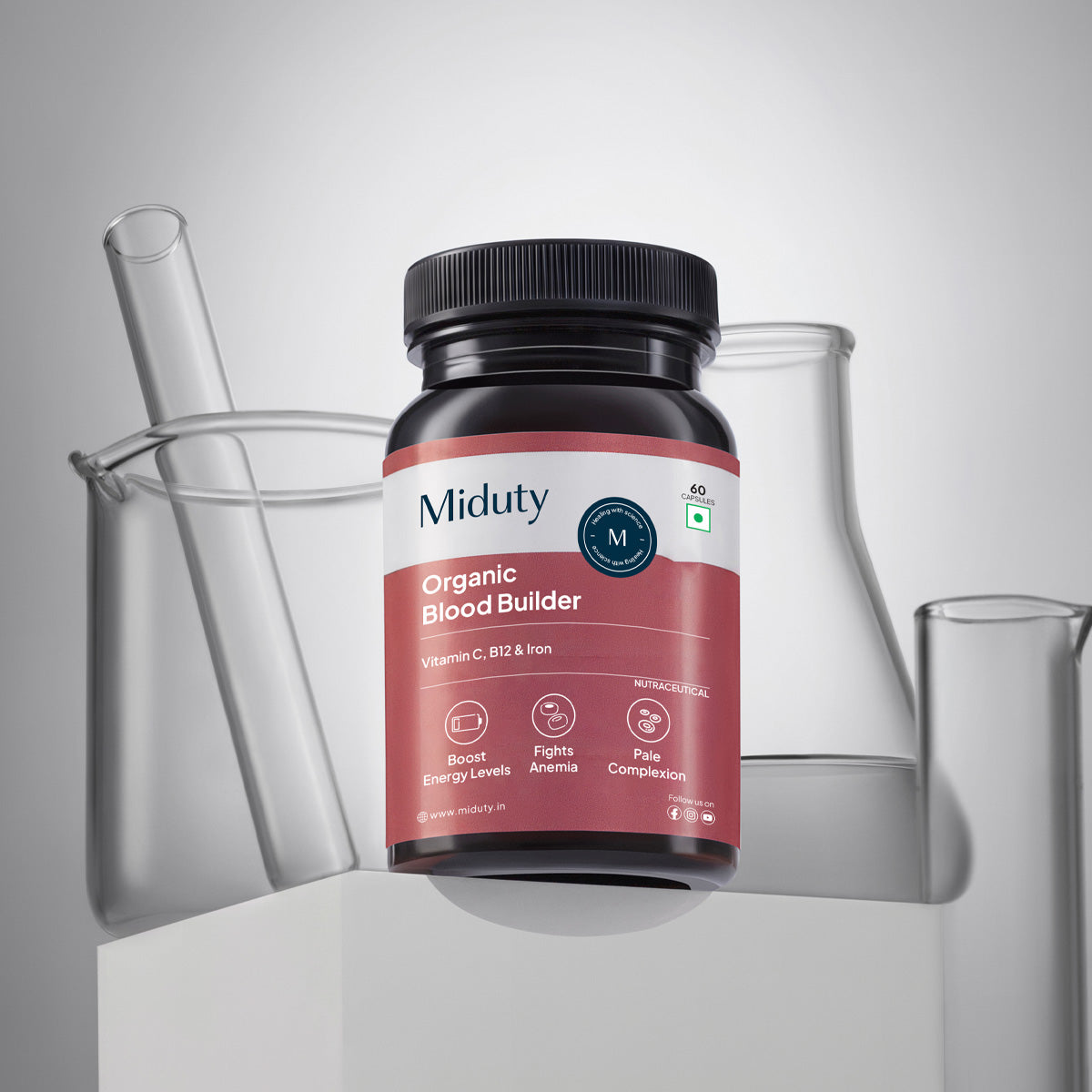
How Vitamin B12 Deficiency Can Lead to Weight Gain?
Have you ever stepped on the scale and, despite your best efforts at eating well and moving more, noticed the numbers creeping upward? It's frustrating, demotivating — and it might leave you wondering if there's something more than just calories at play.
What if nutrition isn't just about "less food, more movement," but also about specific nutrients working behind the scenes? One nutrient that often comes up in this conversation is Vitamin B12.
Some people claim that if your B12 is low, you'll gain weight — and it's tempting to think: Could this tiny vitamin be a hidden barrier to maintaining a healthy weight?
In this article, we'll take a deep dive into that question: Can low Vitamin B12 cause weight gain? We'll explore how this nutrient affects metabolism, what deficiency symptoms look like, and what you can do to support both your B12 levels and your weight goals.
Key Takeaways
1. B12 supports metabolism and energy production. B12 helps convert food into energy and supports red blood cell and nerve function. When levels are low, metabolism and energy efficiency can decrease.
2. Low B12 doesn't directly cause weight gain — but it can contribute indirectly. Deficiency can lead to fatigue, slower metabolism, hormonal changes, and poor mood or sleep all of which make weight management harder.
3. Certain groups are more at risk of deficiency. Vegetarians, vegans, older adults, people with digestive disorders, and those on medications like metformin or acid reducers are more prone to low B12.
4. Deficiency symptoms are often subtle but impactful. Fatigue, weakness, tingling, brain fog, and mood changes can be signs of low B12, yet they're often mistaken for stress or overwork.
5. Restoring B12 helps energy and metabolism but it's not a weight-loss shortcut. Proper diet, supplementation (if needed), balanced nutrition, and healthy lifestyle habits work together to support energy and weight goals.
What is Vitamin B12, and Why Is It Important?
Vitamin B12 (also called cobalamin) is a water-soluble vitamin that plays several critical roles in your body:
- It's essential for red blood cell formation, nerve function, and DNA synthesis.
- It helps convert food into energy by supporting the metabolism of fats, proteins, and carbohydrates.
- It's found naturally in animal products such as meat, fish, dairy, and eggs, and in some fortified foods.
Because B12 supports energy and metabolism, it's easy to imagine that if you're low in B12, you might feel tired, sluggish, or "not yourself." This could affect your activity levels, how efficiently you process food, and ultimately, your weight. However, the connection between low B12 and weight gain isn't a simple cause-and-effect relationship.
What is Vitamin B12 Deficiency?
Vitamin B12 deficiency occurs when the body lacks enough vitamin B12, an essential nutrient that supports red blood cell formation, nerve function, and DNA production. Without adequate levels, the body can't produce healthy red blood cells, leading to fatigue, weakness, and neurological problems. This deficiency can result from poor dietary intake, especially in vegetarians and vegans, or from conditions that affect absorption, such as pernicious anemia or gastrointestinal disorders. Early detection and treatment are crucial to prevent long-term complications.
How Vitamin B12 Deficiency Can Lead to Weight Gain?
While Vitamin B12 deficiency isn't a direct cause of weight gain, it can affect your metabolism and energy levels in ways that make managing weight more challenging. Here's how:
1. Reduced Energy and Increased Fatigue
When you're deficient in Vitamin B12, your body struggles to produce enough healthy red blood cells, leading to fatigue and weakness. This lack of energy can reduce your physical activity, making it easier to gain weight over time. If you're too tired to exercise or move as much during the day, your calorie burn decreases, even if your food intake stays the same. [1]
2. Slower Metabolism
Vitamin B12 plays a vital role in breaking down and converting fats and proteins into energy. When levels are low, your body may not metabolize these nutrients efficiently. As a result, metabolism can slow down slightly, potentially leading to weight gain over time. [2]
3. Fat-Cell and Hormonal Changes
Emerging research suggests that B12 deficiency can influence how fat cells form and store energy. Low B12 may alter fat metabolism, encouraging fat accumulation and making it harder for the body to mobilize fat stores. [3]
4. Overlapping Symptoms That Affect Lifestyle
B12 deficiency can cause symptoms such as depression, brain fog, and poor sleep — all of which can indirectly contribute to weight gain. When mental and physical energy are low, you're more likely to reach for comfort foods, skip workouts, or feel too fatigued to make healthy choices.
5. Digestive Issues and Malabsorption
Low B12 can sometimes result from poor absorption rather than lack of intake. People with gastrointestinal issues (like celiac disease, Crohn's disease, or those who have had gastric surgery) may not absorb nutrients efficiently. This can lead to metabolic imbalance — affecting weight regulation and energy levels.
Who Is Most at Risk of Low B12 Levels?
You may be at risk of Vitamin B12 deficiency if you fall into one or more of the following categories:
- Vegetarians and vegans: Since B12 is mainly found in animal products, those who don't eat meat, fish, or dairy are more prone to deficiency.
- Older adults: As we age, our ability to absorb B12 decreases.
- People with digestive conditions: Issues like celiac disease, Crohn's disease, or gastric bypass surgery can affect absorption.
- People taking certain medications: Metformin (for diabetes) or long-term use of acid-reducing medications can interfere with B12 absorption.
- Individuals with poor diet quality: A diet low in nutrient-dense foods may not provide enough B12 or the cofactors needed for proper metabolism.
If you experience unexplained fatigue, weakness, or mental fog — it's worth asking your healthcare provider for a simple blood test to check your B12 levels.
Symptoms of Vitamin B12 Deficiency
Low Vitamin B12 can cause a range of symptoms that affect both body and mind:
- Persistent tiredness or weakness
- Pale or yellowish skin
- Shortness of breath
- Dizziness or light-headedness
- Tingling or numbness in hands and feet
- Difficulty concentrating or memory problems
- Mood swings, depression, or irritability
Because these symptoms are so general, many people overlook them — attributing fatigue to a busy life or stress — when it may actually stem from low B12.
How to Correct Low B12 Levels?
If testing shows that your Vitamin B12 is low, there are several ways to restore healthy levels:
1. Dietary Sources
Incorporate more B12-rich foods into your diet:
- Meat (beef, liver, chicken)
- Fish and shellfish (salmon, tuna, trout, clams)
- Eggs and dairy (milk, cheese, yogurt)
- Fortified plant-based milks or breakfast cereals (for vegetarians/vegans)
2. Supplements
B12 supplements come in oral tablets, sublingual (under-the-tongue) drops, or injections. Your doctor can help you decide which form and dosage are best depending on your deficiency's cause.
For people with absorption problems, injections or high-dose sublingual forms are often recommended because they bypass the digestive system.
3. Maintain a Balanced Diet
Even with proper supplementation, an unbalanced diet can still hinder your weight-management efforts. Focus on whole, minimally processed foods, balanced macronutrients, and enough protein to support metabolism.
4. Lifestyle Adjustments
Boosting your energy through exercise, proper hydration, and adequate sleep will help your metabolism work efficiently — complementing your improved B12 status.
Does Vitamin B12 Promote Weight Loss?
You might have seen clinics or online ads promoting Vitamin B12 injections for rapid weight loss. While these injections can boost B12 levels in deficient individuals and improve energy, there's no strong evidence that they cause weight loss on their own.
If your B12 levels are normal, additional injections won't speed up your metabolism or melt fat. The primary benefit of B12 supplementation is restoring normal function — not accelerating weight loss beyond what diet and exercise achieve.
Case Example: Understanding the Connection in Real Life
Imagine two people:
1. Person A: Has low Vitamin B12, feels constantly tired, skips workouts, and relies on quick, high-calorie snacks for energy. Over months, they gain weight, not because B12 directly made them heavier, but because low energy led to fewer calories burned.
2. Person B: Has normal B12 levels but eats in a calorie surplus and exercises rarely. They gain weight too — but for entirely different reasons.
In both cases, lifestyle choices and calorie balance are the primary drivers. However, correcting a B12 deficiency in Person A can restore energy levels, helping them move more and manage weight better.
How to Support a Healthy Metabolism?
If you're addressing low B12, these complementary habits can enhance your overall metabolic health:
1. Eat protein with every meal — it helps preserve lean muscle and supports calorie burning.
2. Stay hydrated — dehydration can slow metabolism and reduce energy.
3. Prioritize sleep — poor sleep affects hunger hormones and weight regulation.
4. Move regularly — even light daily activity boosts circulation and metabolic rate.
5. Manage stress — chronic stress raises cortisol, which can lead to fat storage.
When combined with adequate B12 levels, these habits create a sustainable foundation for maintaining a healthy weight and energy balance.
Final Thoughts
If your weight seems to increase despite your efforts, consider checking your Vitamin B12 levels — especially if you're feeling constantly tired or sluggish. While B12 deficiency isn't a magic explanation for weight gain, it can be a missing piece of the puzzle that affects how energized and balanced your metabolism feels.
Think of B12 as a support player in your weight-management journey: not the star of the show, but an important backstage force that keeps your body performing well. By ensuring you're not deficient and maintaining healthy daily habits, you'll set yourself up for better energy, improved mood, and long-term success in maintaining a healthy weight.
FAQ's on Vitamin B12 Deficiency and Weight -
Q1 - Can taking vitamin B12 cause weight gain?
No, taking vitamin B12 does not directly lead to weight gain. However, a deficiency in this vitamin may contribute to weight gain over time, as fatigue and low energy can reduce physical activity. Correcting a B12 deficiency can boost energy levels and metabolism, potentially supporting healthy weight management.
Q2 - Can a B12 deficiency make it hard to lose weight?
A vitamin B12 deficiency can make losing weight more difficult by causing fatigue, weakness, and a reduced appetite, which may lower physical activity and disrupt healthy eating habits. Although there's little evidence that B12 deficiency directly causes weight gain, addressing the deficiency can help restore energy and overall well-being — an important foundation for successful weight loss.
Q3 - How much B12 per day for weight loss?
There is no specific daily dose of vitamin B12 recommended for weight loss, as research does not show a strong direct connection between B12 supplementation and losing weight. The recommended daily allowance (RDA) for most adults is 2.4 mcg, which can usually be met through a balanced diet. When it comes to weight management, the key is to ensure you are not deficient in B12, something best confirmed by a healthcare provider since deficiency has been linked to a higher risk of obesity.
Q4 - Does B12 speed up metabolism?
Vitamin B12 doesn't directly increase metabolism, but it plays a vital role in energy production and the breakdown of fats and proteins. Having adequate B12 levels helps your body maintain normal metabolic function, while a deficiency can slow metabolism, leading to fatigue and possible weight gain. Ensuring sufficient B12 supports a healthy, efficient metabolism, though supplementation is unlikely to provide an additional boost if your levels are already within the normal range.
Q5 - Can too much B12 cause weight gain?
No, taking too much vitamin B12 is unlikely to cause weight gain since it is a water-soluble vitamin, and excess amounts are typically excreted through urine. B12 supports energy metabolism and has even been associated with a lower risk of obesity. On the other hand, a deficiency can lead to fatigue, slower metabolism, and increased cravings, which may contribute to weight gain. Maintaining adequate B12 levels helps support healthy energy levels and metabolism, which can aid in weight management.
Q6 - Can you gain weight from lack of B12?
While vitamin B12 deficiency doesn't directly cause weight gain, it can indirectly contribute by leading to fatigue and a slower metabolism, both of which reduce physical activity and energy expenditure. Research has shown a correlation between lower B12 levels and higher body weight, though it remains unclear whether deficiency causes weight gain or results from it. Correcting a B12 deficiency through proper supplementation can help restore energy levels and metabolic function, supporting healthy weight management.
References













